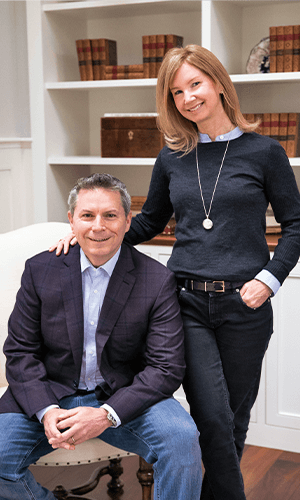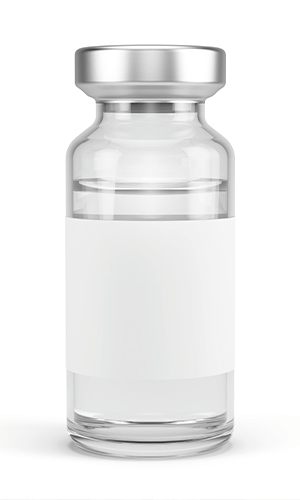With the messenger RNA platform developed by his company, Ron Renaud ’90 is sending forth treatments for Covid-19 and other diseases.
Years ago, Ron Renaud ’90 was fly-fishing for trout with a doctor outside Los Angeles, trying to decide whether to go to medical school or stay in the biotech industry. “He said to me, ‘You know, perhaps by not going to medical school, and creating value in other ways, you could have even more impact on the lives of patients,” Renaud remembers. “I’ve never ever forgotten that conversation.”

Two decades later, as CEO of Translate Bio, a clinical-stage mRNA therapeutics company based in Lexington, Mass., Renaud has the ability to impact millions of lives with a new vaccine for Covid-19. It uses the same messenger RNA (mRNA) platform that has proved so effective with the Moderna and Pfizer-BioNTech vaccines, along with a few tweaks Renaud and his colleagues hope will boost its efficacy even more. The company is using the same platform as a therapeutic approach to tackle other diseases that have long resisted a cure. “There are a lot of areas in which mRNA can play a role in treating the underlying causes of some of these genetic diseases,” Renaud says. “It’s very precise, almost surgical, in how we can address very specific mutations that represent the underlying causes of so many rare diseases.”
Renaud grew up in central Massachusetts and came to Saint Anselm thinking he’d study pre-med, but after the difficulties of organic chemistry and comparative anatomy, switched to psychology instead. He still remembers lessons from now-chair Professor Paul Finn ’73 he uses as a leader today. “We spent a lot of time talking about what really drives people,” he says. “Today my job is a lot about understanding and managing and getting the best out of people.”
His wife Marianne (Gorman) Renaud ’91 also attended Saint Anselm, studying political science, but ironically the two never met on campus. It wasn’t until after graduating, when he was working at Dana-Farber Cancer Institute in Boston, and she was working down the street at Brigham and Women’s Hospital, that a fellow Saint Anselm grad introduced them on a bus. They connected at an alumni dance and started dating, getting married two years later. When Renaud got a job at the biotech job Amgen in California, Marianne worked doing human relations at Sebastian International and L’Oréal.
After finally deciding against med school, Renaud got an MBA at the University of Southern California, and eventually the couple moved back to the East Coast, where he worked as a biotech company analyst on Wall Street. They then moved back to Massachusetts, where Renaud became president and CEO of Idenix Pharmaceuticals, a company identifying treatments for viral diseases that was subsequently sold to Merck. Marianne, meanwhile, took care of the couple’s two children, Owen and Jack, while volunteering in administration at Newton-Wellesley Hospital.
Translate Bio acquired its mRNA technology in late 2016, before it was widely recognized as a breakthrough platform for vaccines. Initially, the company focused on correcting rare genetic diseases such as cystic fibrosis and ciliary dyskinesia, both of which attack the lungs. “DNA makes mRNA and mRNA makes protein,” Renaud explains. “It is the code for every single thing that happens in the human body.” By carrying the mRNA into the right cells, it can rewrite the proteins that are created. “You create the right proteins—or, really, correct the wrong proteins,” Renaud says. “Then you let the cellular machinery take over and do its thing.”

The Covid vaccine candidate, called MRT5500, is being jointly developed with French pharma company Sanofi and uses a lipid nanoparticle to deliver the mRNA into the cell. Once there, it produces a protein that spurs the body’s antibody response to Sars-CoV-2, the virus that causes Covid-19. By inserting a few extra amino acids into the sequence, the companies hope to create an antibody response even more effective against the coronavirus’s distinctive spike protein. Even though American and European populations are well on their way to being vaccinated, Renaud hopes the vaccine can help reduce infections and deaths in other parts of the world such as Asia and Africa.
“There, vaccination rates are still in the single digits,” he says. “As long as these variants keep cropping up, we’re going to need vaccines into 2022, 2023, and beyond.” As Renaud raced to get the vaccine into production while quarantined, the whole family became involved in the quest. “It’s almost like the boys and I were part of the executive team,” says Marianne. “We were a fly on the wall during some very intense meetings.”
Renaud’s hard work has paid off, however, as the vaccine is now in Phase 1/2 clinical trials and will hopefully be approved in 2022. With that and the other vaccine and therapeutic treatments the company is developing, he truly will fulfill the promise of that conversation over trout fishing years ago, impacting many more lives than he ever could have as a doctor.
